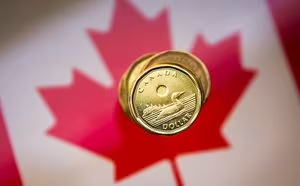The Canadian dollar reached its highest level in eight weeks on Tuesday, as investors grew more optimistic about the country’s economic outlook and the prospects of a soft landing for the housing market.
The loonie gained 0.4 per cent to close at 79.87 US cents, its strongest level since Sept. The currency has risen more than 3 per cent since hitting a seven-month low of 77.41 US cents on Oct. 26.
One of the main drivers of the loonie’s rally was the better-than-expected retail sales report for September, which showed a 0.9 per cent increase from the previous month, beating the consensus forecast of 0.6 per cent. The report also revised the August sales figure upward to a 0.4 per cent decline, from the initial estimate of a 0.6 per cent drop.
The retail sales data suggested that consumer spending remained resilient in the third quarter, despite the impact of the fourth wave of the COVID-19 pandemic and the supply chain disruptions that have affected many sectors. The data also supported the view that the Bank of Canada will maintain its hawkish stance and raise interest rates sooner than expected.
Another factor that boosted the loonie was the positive sentiment around the housing market, which has shown signs of cooling down after a record-breaking run. The Canadian Real Estate Association reported on Monday that home sales fell 6.9 per cent in October from September, while the national average price declined 1.2 per cent over the same period. However, the association also said that the market was still “historically strong” and that the slowdown was likely a result of the lack of inventory rather than a drop in demand.
Some analysts said that the housing market was undergoing a “soft landing” rather than a crash, which would be beneficial for the economy and the financial stability. A soft landing would mean that the market would adjust to a more sustainable pace of growth, without triggering a sharp correction that could hurt consumer confidence and spending.
The loonie also benefited from the weakness of the US dollar, which fell against most of its major peers on Tuesday, as investors awaited the release of the minutes of the Federal Reserve’s latest policy meeting on Wednesday. The minutes are expected to provide more clues on the Fed’s plans to taper its bond-buying program and to raise interest rates in response to the rising inflation pressures in the US.
The loonie’s outlook remains positive, as the Canadian economy is expected to rebound in the fourth quarter and to outperform the US economy next year, according to some forecasts. The loonie is also likely to get support from the high commodity prices, especially oil, which is Canada’s largest export. However, the loonie could face some headwinds from the potential political and trade tensions with China, which is Canada’s second-largest trading partner.



Comments
Post a Comment